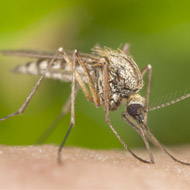
Project aims to build a robust network of facilities
A new international project for the control of vector-borne diseases in Europe is to be launched in France.
The Infravac2 Project is an international consortium of 24 partner institutions coordinated by the Institut Pasteur, Paris.
Launching in March, one of the key aims of the project will be to establish new experimental standards for insect infection studies. Dr Anthony Wilson, group leader for integrative entomology at The Pirbright Institute, will be leading the programme of work.
“Diseases do not respect borders and international collaboration like this are the most effective and efficient way to combat the disease threats facing the UK and the world in the 21st century,” he said.
“The cutting edge high containment laboratories that we now have at Pirbright, have given us a new capability to work with high impact human pathogens. The Infravec2 project is a great opportunity to use these facilities to support international research into vector-borne diseases like Zika, dengue and chikungunya, which are increasingly moving into new areas.”
Scientists acknowledge that the lack of internationally recognised standards is a major scientific problem as it prevents the reproducibility of results between different laboratories. This means that the real-world significance of laboratory studies can be uncertain, impeding efforts to predict and control disease.
Diseases spread by mosquitoes and other insects are a major concern for public health and the global economy. While they used to only affect those living in tropical regions, they are now moving to cooler regions like Europe. Scientists believe the most immediate threat to the UK are Culicoides - biting midges that spread devastating livestock diseases such as Bluetongue and Schallenberg.
Funded by the European Commission’s Horizon 2020 Research Infrastructure Programme, the Infravec2 Project will be officially launched in Paris on 15-17 March 2017 and will continue through to 2021.
Looking ahead, the project aims to build a robust network of facilities which will enable Europe to respond more effectively to insect-transmitted disease epidemics and to predict and prevent future ones.



 FIVP has shared a survey, inviting those working in independent practice to share their views on the CMA's proposed remedies.
FIVP has shared a survey, inviting those working in independent practice to share their views on the CMA's proposed remedies.